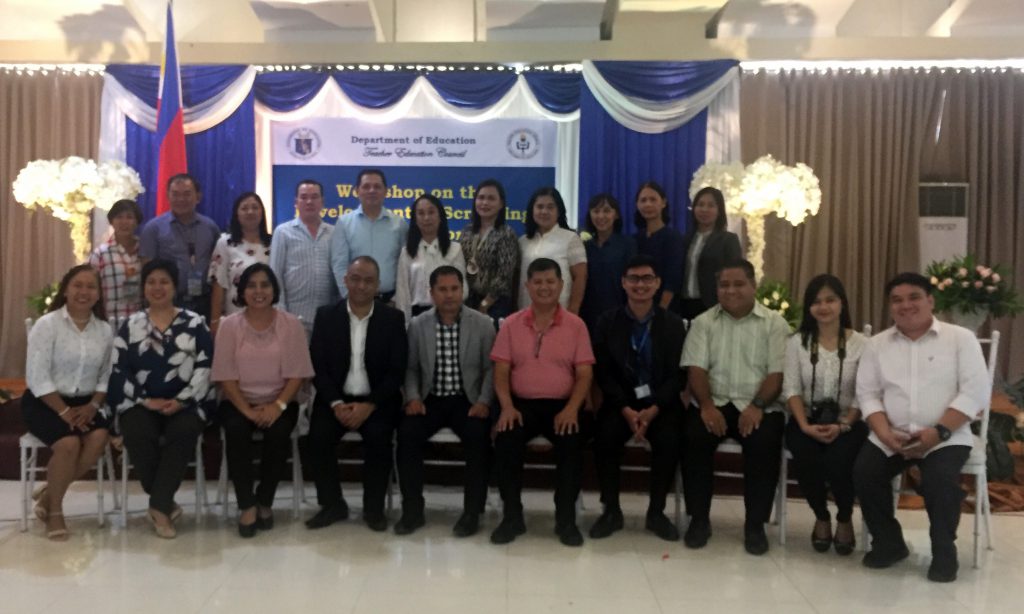
The proposed Screening Policy for Incoming Education Students was anchored on RA No. 7784 of 1994, An Act to Strengthen Teacher Education in the Philippines to serve as an admission requirement. It will be designed to improve the entry skill levels of basic education graduates who wish to enroll in the Teacher Education programs. Proposed requirements for admission are results from Basic Education Exit Assessment (BEEA), special accomplishment, entrance examination, interview, checking of communications skills and examining attitudes for future teaching profession (Lukas & Samardzic, SGEM 2015).
The legal bases of proposing this screening policy are: (1) CMO 46 s. 2012 requiring a paradigm shift to outcomes-based in implementing the curriculum; (2) CMO 75 s. 2017 section 17 Admission and Retention Policy; (3) RA 10533 K-12 Enhanced Basic Education Curriculum; (4) RA 10968 Philippine Qualifications Framework; (5) DO 42 s.2017 National Adoption and Implementation of the Philippine Professional Standards for Teachers (PPST); and (6) RA 10931 Universal Access to Quality Education. It is expected that this proposed admission policy will serve as entry requirement for Incoming Education Students. This policy will enhance the entry skill level of the applicants to the different specializations of Teacher Education programs, and will develop a contextualized framework for Teacher Education curriculum implementation.
This project started from the consultative and planning meeting with representatives from DepEd and CHED held last July 3, 2019 at the TECs Conference Room and on July 23 – 26, 2019 Workshop on the Development of Screening Policy for Incoming Education Students was conducted.
Day 1 of the workshop started with the sharing of resource speakers who discussed information, research studies, and relevant policies to serve as bases in the development of the policy.
Dr. Rita May P. Tagalog, Focal Person of the project and TEC Representative for Visayas, presented the background of the project. According to her, the urgency of having a unified screening policy for the incoming education students will elevate and maintain the dignity and nobility of teachers. It can also place the teaching profession into a higher level and make teaching profession as the first choice of the incoming professionals.
Mr. Jerreld M. Romulo, Senior Education Program Specialist from Bureau of Education Assessment (BEA) shared the results of Test of English Proficiency for Teachers and Process Skills Test (TEPT–PST), National Career Assessment Examination (NCAE), and BEEA for Grade 12. TEPT–PST identify and provide baseline information on the training needs of teachers especially in the use of English Language as a medium of instruction. According to him, from 2016–2017 most of the teachers are nearly proficient in terms of structure, written expression, reading comprehension and process skills. NCAE on the other hand, provides guidelines to individual learners for their future educational and career choices and provide basis for profiling learners’ aptitude in the four Senior High School tracks.
Dr. Roel F. Bermejo, Superintendent of Capiz Division, discussed Ethical Standards based on the Code of Ethics for Professional Teachers.
Dr. Jennie V. Jocson, Deputy Director of Research Center for Teacher Quality (RCTQ) shared the Beginning Teachers Indicators (BTIs) as stipulated in DO 42, s. 2017 also known as National Adoption and Implementation of the Philippine Professional Standards for Teachers (PPST). The indicators and the competencies of would be teachers were matched to ensure its alignment with PPST.
After all the sessions, workshop 1 followed. The participants were asked to unpack the BTIs.
Day 2 started with the management of learning (MOL) followed by the session given by Dr. Aldrin Darilag, CHED Commissioner on Global Teacher and the Key Competencies for Sustainability. He stated that “Education can and must contribute to a new vision of sustainable global development” based on UNESCO, 2015. He underscoredIdentifying and awareness on the 21st century skills (knowledge and thinking skills, social skills and action competencies) has a big role to play for the sustenance for the global development. As a teacher inside the classroom and often on hand with the pupils/students, it is important to identify if what kind of teacher you are (classroom teacher, school teacher or a global teacher)?
To be familiar with different admission procedures from different colleges and universities, Dr. Runvi Manguerra shared to the group the admission policies both local and international colleges and universities. That for local colleges and universities, common to them are placement test or entrance exam was administered before entering and for international colleges and universities, the SAT/ACT results, class rank and HS grade and entrance exams are important before entering the college. The process of admission varies widely from country to country, and sometimes from institution to institution.
Ms. Karla Sio, a representative from Policy Research Division of Planning Service, shared DepEd Order 13, s. 2015 on Establishing a Policy Development Process in the Department of Education. She further discussed the standard format and pattern when developing a policy.
Ms. Lovelaine Basillote from Philippine Business for Education pooled their advocacy on their project on STEP – UP (Scholarships for Teacher Education Program to Uplift Teacher Quality in the Philippines). They have different process undergone by those scholars. And they assured that after undergoing the program, they will come up with highly qualified teacher, faster school to work transition, improved employability and of course and improved standard of living.
Workshop 2 followed in the afternoon. Participants were asked to draft a screening policy based on the four essential parts of a policy.
On the 3rd and 4th day, participants were regrouped and asked to consolidate the outputs of workshop 2. They were instructed to enhance a particular part of the policy. Reporting followed on the last day.

